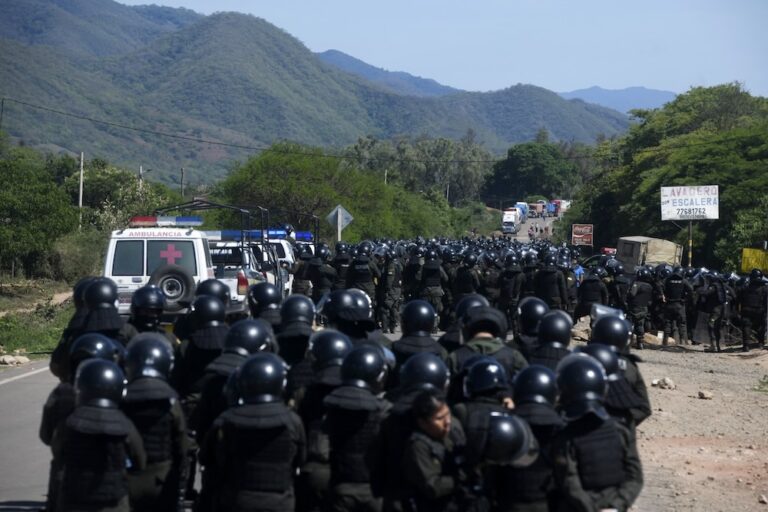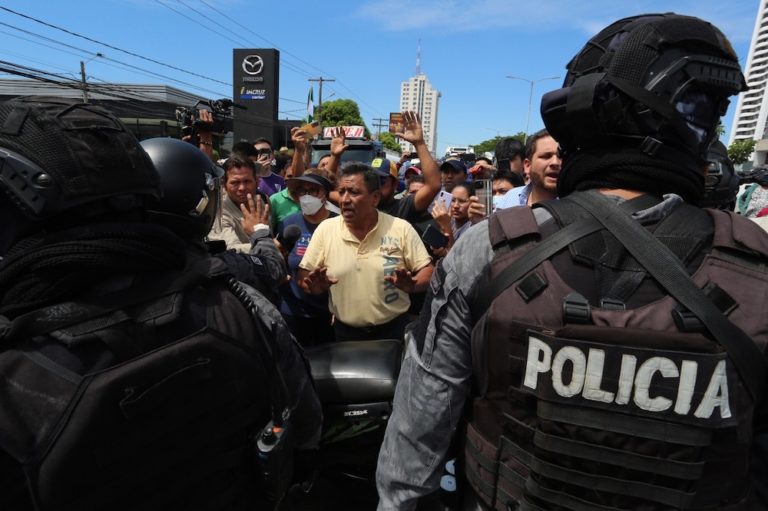(CPJ/IFEX) – The following is a 17 October 2003 CPJ press release: BOLIVIA: Media outlets and journalists attacked, threatened as political crisis intensifies New York, October 17, 2003-The Committee to Protect Journalists (CPJ) is deeply disturbed that several media outlets and journalists have been attacked or threatened this week during month-long antigovernment protests that threaten […]
(CPJ/IFEX) – The following is a 17 October 2003 CPJ press release:
BOLIVIA: Media outlets and journalists attacked, threatened as political crisis intensifies
New York, October 17, 2003-The Committee to Protect Journalists (CPJ) is deeply disturbed that several media outlets and journalists have been attacked or threatened this week during month-long antigovernment protests that threaten to topple the Bolivian government.
On Wednesday, October 15, unidentified attackers blew up the transmission equipment at TV station Canal 13 and Catholic radio station Radio Pío XII, both based in the city of Oruro, forcing the outlets off the air. According to Radio Pío XII journalist Grover Alejandro, listeners began calling the station at around 6 p.m. to report that they had lost Canal 13’s signal, which had been intermittently feeding its audio signal from Radio Pío XII’s broadcasts.
About 15 minutes later, more listeners called saying they could not receive the radio station’s signal. Other callers said they had heard two explosions. Alejandro told CPJ that a security guard on the hill where the transmitters are located said that several hooded men armed with handguns had subdued him and detonated two bombs, destroying the equipment.
Both Radio Pío XII, which is affiliated with the Educación Radiofónica de Bolivia (ERBOL) radio network, and Canal 13, which is run by the Technical University of Oruro, have extensively covered the mass protests against the government. University officials blamed the attack on the government, according to the Oruro daily La Patria. Radio Pío XII remains off the air, while Canal 13 was able to resume broadcasting using old equipment, according to Alejandro.
Also on October 15, army officers threatened Carlos Colque Muriel, ERBOL’s correspondent in Patacamaya, while he was covering clashes between miners and the army in the town, located 62 miles (100 kilometers) south of the capital, La Paz. Colque told CPJ that he was hit in the back with a rubber bullet fired by soldiers but suffered no injuries, apparently because the bullet was fired from a long distance. According to Colque, while he was reporting, soldiers pointed their guns at him several times.
The La Paz weekly Pulso reported that its special October 15 issue, which contained an editorial calling on President Gonzalo Sánchez de Lozada to resign, had been “partially confiscated.” According to Gustavo Guzmán, Pulso’s editor-in-chief, several individuals in a green van who pretended to be Pulso staff members confiscated copies of the weekly in a southern area of La Paz. Newspaper vendors later confirmed those reports to the weekly. Pulso, which circulated normally in the rest of the city, also discovered that someone had been buying copies in large numbers in a northern area of La Paz. Guzmán said they suspect that government officials might have been attempting to take copies of the weekly out of circulation. The La Paz daily El Diario also claimed that unidentified individuals had confiscated several copies of its October 15 edition, which included an article discussing Sánchez de Lozada’s possible resignation.
Also on October 15, supporters of the opposition Movement towards Socialism (MAS) attacked Eduardo Pinzón, a Spanish cameraman with Radio Televisión Española, according to local news reports. Local TV channels Canal 36-Cadena A and Radio Televisión Popular suspended broadcasting for several hours because of reported threats, according to the Santa Cruz daily El Deber.
In the midst of this crisis, Bolivian government officials have accused some media outlets of inciting the population to commit illegal acts, including “sedition.” However, the government has taken no legal action against any journalists or their employers.
The antigovernment protests, which began about a month ago in La Paz and the neighboring city of El Alto and then spread to the rest of the nation, rallied union workers, members of neighborhood associations, miners, students, and coca growers against government plans to develop a pipeline to export natural gas from Bolivia, a landlocked country, through Chile. However, after the government violently repressed the protests, killing more than 50 people and injuring hundreds, demonstrators broadened their demands to include the president’s resignation.
“The Bolivian government must guarantee press freedom and protect journalists in the current crisis,” said CPJ Executive Director Ann Cooper. “Furthermore, officials should open an investigation immediately to determine if government authorities had anything to do with the confiscation of the newspapers.”
For more information about press freedom conditions in Bolivia, visit www.cpj.org. CPJ is a New York-based, independent, nonprofit organization that works to safeguard press freedom around the world.


